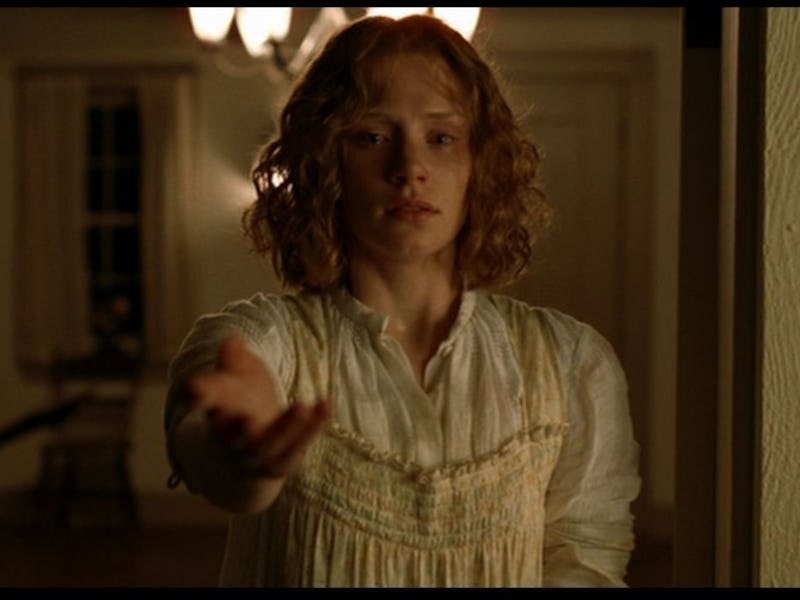On Inauguration Day, ‘The Village’ Reminds America We Can't Live In The Past
We can't make America great again.

In M. Night Shyamalan’s 2004 film The Village, Edward Walker (William Hurt) pleads with his fellow elders of a secluded puritanical society to let his blind daughter Ivy (Bryce Dallas Howard) temporarily leave. “Yes I have risked, I hope I am always able to risk everything for the just and right cause, he says. “If we did not make this decision, we could never again call ourselves innocent, and that in the end is what we have protected here, innocence!” It’s a noble appeal to reason made all the more ironic by the film’s time-bending twist ending: The Village, thought to be set sometime during the 17th century, is actually a social experiment set in present day.
While critics like Roger Ebert felt that The Village was “a shaggy dog story,” filled with secrets as cheap plot tricks, the movie also hides a surprisingly prescient statement about the fetishization of ‘simpler times’ — precisely that there is no such thing.
No one is innocent, certainly not Walker, who was an American history professor at the University of Pennsylvania before he created his titular village by preying on other grieving people at a counseling clinic. He enticed each follower to join him in creating a sustainable moral paradise that promised protection from their personal traumas.
“My sister did not live past her 23rd birthday. A group of men raped and killed her,” free-spirited villager Mrs. Clack (Cherry Jones) says in the revelatory twist-ending voiceover. “My husband, Michael, left for the supermarket at a quarter past nine in the morning,” motherly figure Alice Hunter ( Sigourney Weaver) continues. “He was found with no money and no clothes, in the East River, three days later. “My father was shot by a business partner, who then hanged himself in my father’s closet,” Walker concludes.
These traumatic experiences have caused the villagers to get to the point where they’d rather disengage from reality than deal with it. They build a completely isolated community and force the subsequent generations to walk that deluded path without the agency to choose it on their own. The idea is that if there are no outside influences, future generations will mature into adults that are pure at heart, the kind of people that would never commit the heinous crimes that happened to the founders of the village in the outside world.
Yet the elders ultimately fail at their experiment because there’s no such thing as ‘simpler times’. No point in history has ever excluded the issues of today. People have always been fighting for their personal freedoms, dealing with personal traumas, and facing the cruel realities of the world we live in. As The Village so poignantly highlights, there’s no way to hide, and going backwards to eliminate a problem only exacerbates it. Often the person trying to avoid dealing with the problem, like Edward Walker, is the person who creates it in the first place. By lying to create his perfect utopia, he loses one of his flock, and also potentially his daughter. The only way to deal with grief and the horrors of the world around us is to move forward. And the only way forward is through.
The Village is a sobering look at what happens when people can’t move forward. Trump is clearly one of these people. He was elected on similar fear-based tactics and sloganeering about making America great again and unsubstantiated claims of “crime infested” inner cities that are supposedly rife with superficial, generic dangers. Those bitter rallying cries united an entire group of people who are dealing with the same issues and problems as Hillary or Bernie supporters, but would rather slap a band-aid on it than elect people who want to figure out practical solutions.
It’s not altogether absurd to think that the same irrational angst about personal well-being and the state of modern American culture comes from the same phobias that drove Walker and the elders in The Village. Their delusional puritan sanctuary was rooted in an irrational fetishization of American history as a time without troubles, and as Trump takes office on the promise that he will return us to a similar point, it’s hard not to wonder if we’ll end up like Bryce Dallas Howard or the village elders. One was brave enough to pull her head up out of the sand, and the others ended up becoming the evils they tried to escape.
Shyamalan reserves judgment on the group beyond the mere embarrassment that characters like Edward Walker have kept up the ruse for so long. But it’s obvious to viewers that their village, whose fundamental ideals are based on a fallacy, cannot hold. It’s somehow fitting then that Shyamalan’s newest film, Split, releases on the same day that Trump is sworn into office. Hopefully when we look back in two decades, Spilt won’t be as accurate foreshadowing of America’s future as The Village was.